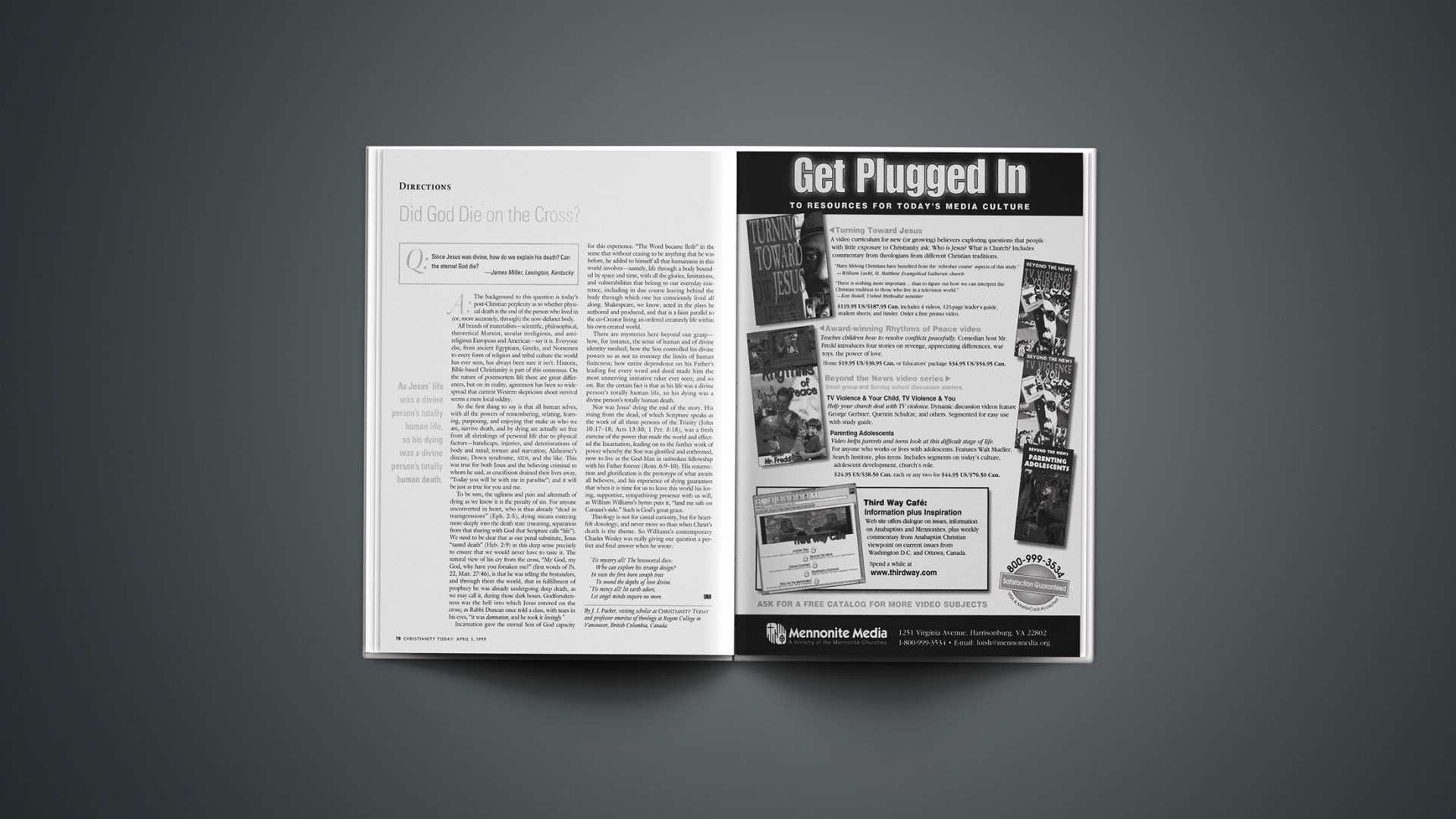Q: Since Jesus was divine, how do we explain his death? Can the eternal God die?
—James Miller, Lexington, Kentucky
A: The background to this question is today's post-Christian perplexity as to whether physical death is the end of the person who lived in (or, more accurately, through) the now-defunct body.
All brands of materialists—scientific, philosophical, theoretical Marxist, secular irreligious, and antireligious European and American—say it is. Everyone else, from ancient Egyptians, Greeks, and Norsemen to every form of religion and tribal culture the world has ever seen, has always been sure it isn't. Historic, Bible-based Christianity is part of this consensus. On the nature of postmortem life there are great differences, but on its reality, agreement has been so widespread that current Western skepticism about survival seems a mere local oddity.
So the first thing to say is that all human selves, with all the powers of remembering, relating, learning, purposing, and enjoying that make us who we are, survive death, and by dying are actually set free from all shrinkings of personal life due to physical factors—handicaps, injuries, and deteriorations of body and mind; torture and starvation; Alzheimer's disease, Down syndrome, AIDS, and the like. This was true for both Jesus and the believing criminal to whom he said, as crucifixion drained their lives away, "Today you will be with me in paradise"; and it will be just as true for you and me.
To be sure, the ugliness and pain and aftermath of dying as we know it is the penalty of sin. For anyone unconverted in heart, who is thus already "dead in transgressions" (Eph. 2:5), dying means entering more deeply into the death state (meaning, separation from that sharing with God that Scripture calls "life"). We need to be clear that as our penal substitute, Jesus "tasted death" (Heb. 2:9) in this deep sense precisely to ensure that we would never have to taste it. The natural view of his cry from the cross, "My God, my God, why have you forsaken me?" (first words of Ps. 22, Matt. 27:46), is that he was telling the bystanders, and through them the world, that in fulfillment of prophecy he was already undergoing deep death, as we may call it, during those dark hours. Godforsakenness was the hell into which Jesus entered on the cross; as Rabbi Duncan once told a class, with tears in his eyes, "it was damnation, and he took it lovingly."
Incarnation gave the eternal Son of God capacity for this experience. "The Word became flesh" in the sense that without ceasing to be anything that he was before, he added to himself all that humanness in this world involves—namely, life through a body bounded by space and time, with all the glories, limitations, and vulnerabilities that belong to our everyday existence, including in due course leaving behind the body through which one has consciously lived all along. Shakespeare, we know, acted in the plays he authored and produced, and that is a faint parallel to the co-Creator living an ordered creaturely life within his own created world.
There are mysteries here beyond our grasp—how, for instance, the sense of human and of divine identity meshed; how the Son controlled his divine powers so as not to overstep the limits of human finiteness; how entire dependence on his Father's leading for every word and deed made him the most unnerving initiative taker ever seen; and so on. But the certain fact is that as his life was a divine person's totally human life, so his dying was a divine person's totally human death.
Nor was Jesus' dying the end of the story. His rising from the dead, of which Scripture speaks as the work of all three persons of the Trinity (John 10:17-18; Acts 13:30; 1 Pet. 3:18), was a fresh exercise of the power that made the world and effected the Incarnation, leading on to the further work of power whereby the Son was glorified and enthroned, now to live as the God-Man in unbroken fellowship with his Father forever (Rom. 6:9-10). His resurrection and glorification is the prototype of what awaits all believers, and his experience of dying guarantees that when it is time for us to leave this world his loving, supportive, sympathizing presence with us will, as William Williams's hymn puts it, "land me safe on Canaan's side." Such is God's great grace.
Theology is not for casual curiosity, but for heartfelt doxology, and never more so than when Christ's death is the theme. So Williams's contemporary Charles Wesley was really giving our question a perfect and final answer when he wrote:
Tis mystery all! The Immortal dies:
Who can explore his strange design?
In vain the first-born seraph tries
To sound the depths of love divine.
Tis mercy all! let earth adore,
Let angel minds inquire no more.
J. I. Packer is visiting scholar at Christianity Today and professor emeritus of theology at Regent College in Vancouver, British Columbia, Canada.










